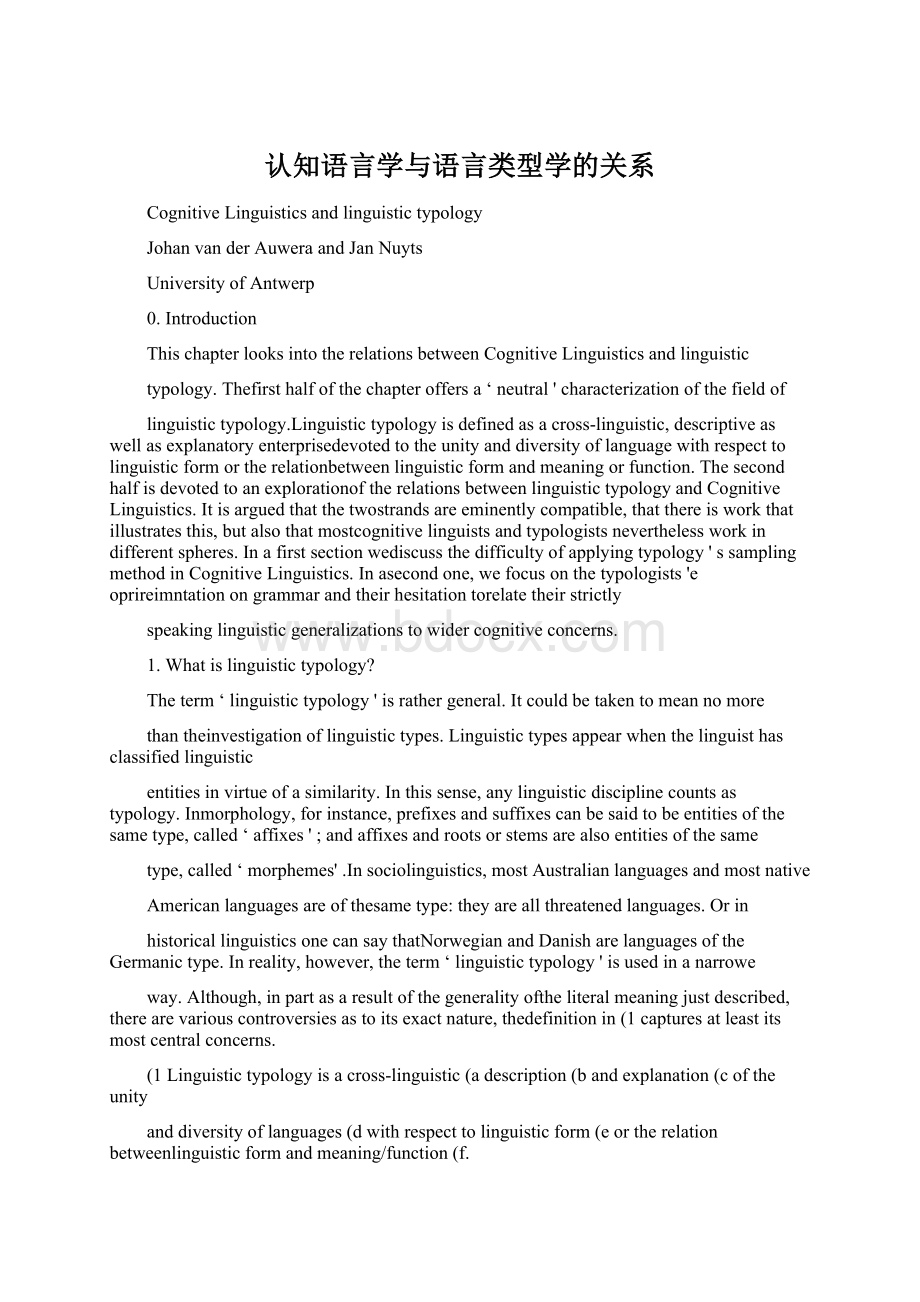认知语言学与语言类型学的关系.docx
《认知语言学与语言类型学的关系.docx》由会员分享,可在线阅读,更多相关《认知语言学与语言类型学的关系.docx(18页珍藏版)》请在冰豆网上搜索。

认知语言学与语言类型学的关系
CognitiveLinguisticsandlinguistictypology
JohanvanderAuweraandJanNuyts
UniversityofAntwerp
0.Introduction
ThischapterlooksintotherelationsbetweenCognitiveLinguisticsandlinguistic
typology.Thefirsthalfofthechapteroffersa‘neutral'characterizationofthefieldof
linguistictypology.Linguistictypologyisdefinedasacross-linguistic,descriptiveaswellasexplanatoryenterprisedevotedtotheunityanddiversityoflanguagewithrespecttolinguisticformortherelationbetweenlinguisticformandmeaningorfunction.ThesecondhalfisdevotedtoanexplorationoftherelationsbetweenlinguistictypologyandCognitiveLinguistics.Itisarguedthatthetwostrandsareeminentlycompatible,thatthereisworkthatillustratesthis,butalsothatmostcognitivelinguistsandtypologistsneverthelessworkindifferentspheres.Inafirstsectionwediscussthedifficultyofapplyingtypology'ssamplingmethodinCognitiveLinguistics.Inasecondone,wefocusonthetypologists'eoprireimntationongrammarandtheirhesitationtorelatetheirstrictly
speakinglinguisticgeneralizationstowidercognitiveconcerns.
1.Whatislinguistictypology?
Theterm‘linguistictypology'israthergeneral.Itcouldbetakentomeannomore
thantheinvestigationoflinguistictypes.Linguistictypesappearwhenthelinguisthasclassifiedlinguistic
entitiesinvirtueofasimilarity.Inthissense,anylinguisticdisciplinecountsastypology.Inmorphology,forinstance,prefixesandsuffixescanbesaidtobeentitiesofthesametype,called‘affixes';andaffixesandrootsorstemsarealsoentitiesofthesame
type,called‘morphemes'.Insociolinguistics,mostAustralianlanguagesandmostnative
Americanlanguagesareofthesametype:
theyareallthreatenedlanguages.Orin
historicallinguisticsonecansaythatNorwegianandDanisharelanguagesoftheGermanictype.Inreality,however,theterm‘linguistictypology'isusedinanarrowe
way.Although,inpartasaresultofthegeneralityoftheliteralmeaningjustdescribed,therearevariouscontroversiesastoitsexactnature,thedefinitionin(1capturesatleastitsmostcentralconcerns.
(1Linguistictypologyisacross-linguistic(adescription(bandexplanation(coftheunity
anddiversityoflanguages(dwithrespecttolinguisticform(eortherelationbetweenlinguisticformandmeaning/function(f.
Intheabovedefinition,sixfeaturesaresingledout.Wewilldiscusstheminsomedetail.
Sayingthatlinguistictypologyshouldbecross-linguistic—feature(a—meansthatobservationsshouldbebasedonawidevarietyoflanguages.Inprinciple,onecannotdotypologyonthebasisofonelanguage,notevenifthelanguageisaconglomerateofdivergentdialects.Also,instudiesofonlyahandfuloflanguagesonedoesnotusuallyspeakabout‘typology',butabout‘contrastivelinguistics'.Thelanguagesselectedsfurthermoreconstituteasample.Thesizeofthesample(whichcanvaryconsiderab—lycf.the22languagesofXrakovskijed.2001onimperativestothe272ofSiewierska1999onverbalagreementisgearedtowardsbeingrepresentativeofthevariationinthetotalityoftheworld'slanguage.Ofcourse,represen-tnaetisvseisnotsolelyamatterofsamplesize.
Typologistsnowhaveincreasinglybettermethodsto
controlforgeneticorarealbias—i.e.thedangeroftakingtoomanylanguagesof(respectivelythesamefamilyorthesameare—aandevenfortypologicalbias—i.e.thedangeroftakingtoomanylanguagesofwhichitisalreadyknownthattheyaretypologicallysimilar(seeDryer1999;Rijkhoff&Bakker1998;Croft2003:
19-28.
Astofeature(b,typologistsfirstofallneedtodescribethefacts.Thisislessobviousthanitmaysound,however.Descriptionsarebasedonanalyticconcepts,whichareunavoidablyinspiredbytheories.Hencenodescriptioncanbefullytheoryindependent.Thisisamatterofdegree,however.Inextremecases,descriptionscanvarytremendously,tothepointevenofbeingincomprehensibletoanybutlinguistsofthesametheoreticalpersuasion.Sincetypologicaldescriptionsshouldbeusefultolinguistsofdiversetheoreticalorientations,however,itisessentialtoreducetheirtheory-dependenceasmuchaspossible.Aversionofthisaimforneutralitycoupledtoanaversiontothecurrentproliferationoflinguistictheorieshasbeencalled“basiclinguistictheory
Dixon(1997:
128-135.
Beforeweturntofeature(c,concerningexplanation,letusclarifywhatitisthatshouldbedescribed.Feature(dstatesthattypologistsarelookingfortheunityanddiversityoflanguages.Typologistsdescribehowlanguagesdiffer,butatthesametimealsohowtheyaresimilarorevenidentical,relativetooneormoreparameters.Featurescharacterizingalllanguagesarecalled‘universals'.Therearewhatmaybecalled‘absoluteuniversals',whichapplytoalllanguages,asillustratedin(2,andthe-rearenon
absoluteor‘statistical'universals,whichholdtrueofmostlanguages,asillustratedin(3.
(2a.Alllanguageshavenounsandverbs.(Whaley1997:
59
b.Alllanguageshavestops.(Maddieson1984:
39
(3MostlanguageshaveeitheranSOVoranSVObasicwordorder.(Tomlin1986:
22Theuniversalsin(2and(3makeaclaimaboutapropertythatdoesnotdependonanyotherpropertyoflanguage,i.e.theyarenot‘tchoenpdriteiofenrareldte'rm—orn—ot
‘implicational'.Buttherearealsoimplicationaluniversals,anditisthesethathavebeenmostprominentinthelastfewdecades.Theytoo,canbeabsoluteorstatistical.(4givesexamplesofabsoluteimplicationaluniversals.
(4a.IfalanguagehasadominantVSOwordorder,itwillhaveprepositions.(Greenberg
1963:
78
b.IfalanguagehasNPinternalagreement,thentheagreementfeaturesmayincludecase,butnotperson.(Lehmann1988:
57
Particularlyinterestingaboutanimplicationaluniversalisthatitdoesnotonlytellusaboutunitybutalsoaboutdiversity.(4a,forinstance,impliesthreesubsetsofpossiblelanguages:
(5a.dominantVSOorderandprepositions
b.nodominantVSOorderandprepositions
c.nodominantVSOorderandnoprepositions
Inlogicalterms,thiskindofuniversalisamaterialimplication.Therearethreesituationsthatmakeittrue:
antecedenttrueandconsequenttrue;antecedentfalseandconsequenttrue;antecedentfalseandconsequentfalse.Hencepostulatingthiskindofuniversalgoeshandinhandwithaclassificationoflanguages.Animplicationaluniversaldoesruleoutonesituation,of
course,viz.thatofatrueantecedentandafalseconsequent.Thus,(4arulesoutthecombinationin(5d.
(5d.dominantVSOorderandnoprepositions
Actually,typologistsnowbelievethatlanguagesoftype(5ddoexist,afterall(see
Song2001:
46.Thismeansthattheuniversalin(4aisstatisticalonlyand,infact,themoretypicaluniversalhasnowbecomethestatisticalone(Dryer1998.Ofcourse,thisobservationinnowaydiminishesthevalueoftheuniversal.Onthecontrary,typologistsmustnowexplainboththeverystrongtendencytoruleout(5d,aswellasthefactthatsomelanguagescanneverthelesswithstandthistendency.
Thistakesustofeature(cofthedefinitionin(1,viz.explanation.Dotypologistsalsoattempttoexplaintheregularitiestheyobserve?
Theydo,butinsomecornersoflinguisticstheirexplanationsaretakentobeofnegligibleorinsufficientquality.Thereasonisthatexplanationrequiresatheory,andnotalltheoriesarecompatible.Asstatedbefore,mosttypologicaldescriptionsaimtoberelativelytheory-neutralandtooffer‘descriptive'or‘empirical'observations,o-f(4th.eThkeinsdeinge(n2eralizationscanthenserveasinputforvarioustheories.Inasimpleworld,then,thetypologistscouldbedeliverersofdata,anditisuptotheoreticianstoexplainthese.Butintheactualworld,thedivisionoflaborisnotthatsimple.Inmoderntypology,mosttypologistsattempttoexplainthedatathemselves,andthispartoftheworkisnottheory-neutralatall.Intermsofthecurrentsharpdivisioninlinguisticsbetweenformalistandfunctionalistparadigms,typologiststendtobefunctionalists.1Asaconsequence,thenon-typologicaltheoreticianofthefunctionalistbrandwillusuallynotonlyappreciatethedatafromthetypologist,butalsohis/hertheoreticalconsiderations.Buttheformalistnon-
typologicaltheoreticianwillusuallyatbestbegratefulforthedatabutfeelfreetoneglectthetypologist'stheory.
Whatcana‘typologicalexplanation'be,then?
Letusfirstdiscusstwofeatures
whichitshouldnothave,atleastnotaccordingtomanytypologists:
itcannotrelyon‘geneticinhe-rtiance',anditcannotbe‘areal'.Bothelementsrequiresomeelaboration.
First,sayingthattypologicalexplanationcannotrelyon‘geneticinheritance
thatasimilaritybetweenlanguagescannotbeaccountedforbysimplyreferringtothe
hypothesisthattheyinheriteditfromacommonancestorlanguage.(Notethatthisonlyconcernsgeneticinheritanceperse,andnotgenetic/diachronicexplanationingene—ralseebelow.Forexample,partofthereasonwhybothmodernDanishandmodernDutchhavetwotypesofpreterite—withadentalsuffixorwithastemvowelchange—isthattheparentlanguagehadthemtoo.Or,mostTibeto-Burmanlanguagesareverbfinalandpostpositional,andtheymayhaveinheritedthisfromProto-Sino-Tibetan(DeLancey1987:
806.Butofcourse,theseobservationsassuchcannotbethewholestory,forlanguagesdoalsoeasilydiscardpartoftheirinheritance,viz.throughlanguagechange.Theessentialquestionis:
whydolanguages(ancestorsandinheritorshavesuchfeatures,andwhydidtheyordidtheynotkeepthemindiachronicchange?
isCroft
Wearetouchinghe